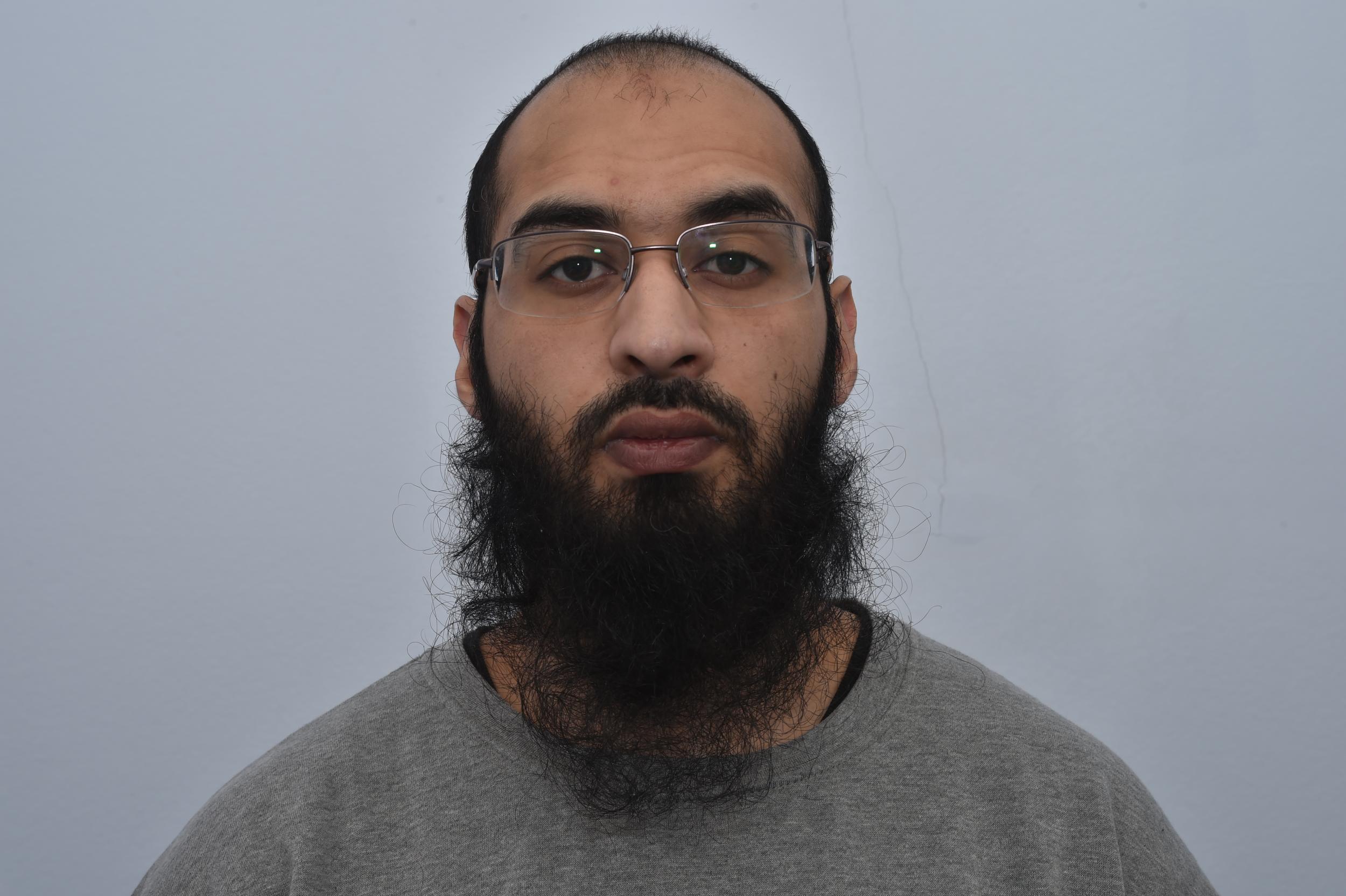Isis supporter planned attack after networking with terrorists inside prison
Sahayb Abu is among numerous terror plotters who have served time in prison as part of a concerning trend

“I’m changing in many ways,” Sahayb Abu told his brother in May 2020. “I wanna worship Allah and be pure. I’m done with everything, I care about the bigger picture ... I dont wanna go back to no clown bullshit.”
Little more than six weeks before, the 27-year-old had been released from jail after serving a sentence for a burglary conspiracy.
Abu was freed from prison on licence in November 2018, but sent back in after breaching the conditions and was made to serve until the end of his term last March.
It was his third prison sentence, following previous stints inside for drug offences in France and knife possession in the UK.
But this time was different. Abu had changed, and security services were concerned about that change.
Counter-terror police started monitoring him and the resulting investigation revealed that within days of his release, Abu was starting to plan an Isis-inspired terror attack.
The former railway worker was arrested after purchasing a sharpened sword, knife and combat vest, and has been convicted of preparing an act of terrorism.
He joins a long line of terrorists and plotters who had criminal histories, including killers who struck in London Bridge, Westminster and Reading, as well as the cell that carried out the 2015 Paris attacks.
Like many of them, Abu also took drugs as part of a hedonistic lifestyle before being jailed in 2017.
“I was in jahiliyyah [ignorance],” he told the undercover officer. “I should have gone a long time ago, I have two brothers that have gone [to Syria] and they’re shaheed [martyred] over there.”
The phenomenon has been dubbed the “crime-terror nexus” by researchers, who found that Isis has attracted many troubled young men through the promise of redemption through jihad and martyrdom.
Rajan Basra, a research fellow at the International Centre for the Study of Radicalisation (ICSR), told The Independent: “We see a lot of jihadists being involved in hedonistic lifestyle - taking drugs, drinking, partying - and then something happened that caused an awakening in their life.”
Mr Basra said Abu’s “search for redemption and purification is very typical among jihadists”, adding: “Often that takes place in the prison environment. You're disconnected from your family and friends, you’ve got problems with the law. It’s easy to have a change in your beliefs because you’re susceptible.”
Abu’s journey to radicalisation, however, started long before his most recent prison sentence.
Two of his half-brothers joined Isis in Syria in 2015, and were later killed in action. Then two years ago, another half-brother, his sister and her husband were jailed for disseminating Isis propaganda.
In October 2017, Abu, his brother and co-defendant Mohamed Abu and half-brother Ahmed Aweys were caught putting up extremist posters in Ilford by police.
“Britain uses your tax money to kill Muslims in Muslim lands,” it read. “Do not take the Jews and Christians as allies.”
The family are believed to have had links with the al-Muhajiroun (ALM) terrorist network, with some of Abu’s relatives previously living on the same London street as the family of its founder Omar Bakri Mohammad.
Abu’s trial heard that he made numerous online searches for Anjem Choudary and other ALM figures, and discussed them with an undercover police officer who was posing as a jihadist gun smuggler.
In one meeting, he bemoaned the tight licence conditions applied to Choudary and fellow ALM leader Mizanur Rahman following their release from prison for inviting support for Isis.

“They can’t talk, no nothing,” Abu told the officer, calling Choudary “brother” and referring to Rahman by his alias Abu Baraa.
The court also heard how Abu had joined ALM-linked extremists, including Ricardo McFarlane, at Speaker’s Corner in Hyde Park.
When questioned about when the activity took place, Abu said it was before his most recent prison sentence.
But even if his views did not change in jail, his intentions certainly did. He went from spreading his beliefs through proselytising to planning a murderous attack.
As he wrote to two of his brothers on 17 June: “There’s something called biding your time waiting for the right moment ... inshallah [hopefully] Allah will make us action men and not chatty men.”
Exactly what triggered his bloodlust will never be known, but Abu’s trial heard that he made friends with at least two terrorist prisoners while serving his most recent sentence at Wandsworth and High Down jails.
He told the undercover police officer that he “loved” pro-Isis propagandist Husnain Rashid, who was jailed for calling for attacks on targets including Prince George.
“I love the brother, he was so full of imaan [belief] but his senses wasn’t with him,” Abu wrote. “Get it done rather than talk and get 28 years.”

He also spent time with Abuthaher Mamun, who was part of an Isis-inspired plot to groom a “mini militia” of children who could launch simultaneous terror attacks across London.
Abu also referred to a third friend from prison, who may have been another terror plotter.
Several terror attacks have been planned or carried out by serving and released prisoners in Britain, including an Isis-inspired attack inside a high-security jail in January 2020 and the stabbings in Fishmongers’ Hall, Streatham and Reading.
Research published last year by the ICSR warned that jailed terrorists may see their time in prison “as an opportunity” to become more extreme and prepare for attacks.
Mr Basra said: “While Abu may not be a clear-cut case of prison radicalisation, if while he was in prison he did meet other extremists networking did take place.
“It’s no surprise because there are so few category A prisons where you could place these inmates.”
The researcher said Abu’s path appeared to mirror a “very typical process we see all around Europe”.
“Maybe before he went into prison he had some sympathies, but the environment seems to have accelerated anything he did have,” he added.
Abu told his trial that he only started consuming material by some of the jihadist ideologues who inspired him after being freed from jail in March 2020, although he may have been lying as he maintained his denial of the plot throughout.

Among his influences were a US hate preacher called Suleiman Anwar Bengharsa, who Abu had direct contact with online after being freed from jail.
Another was Abdullah el-Faisal, another jihadist ideologue who served a prison sentence in the UK and is now awaiting trial for alleged terror offences in the US.
Abu said he listened to “loads of his lectures” when he was released, after looking them up on an archive website that is infamous for hosting jihadist propaganda.
He had also accessed material by al-Qaeda cleric Anwar al-Awlaki, whose lectures and books inciting violent jihad have been found in the possession of the vast majority of English-speaking terror plotters.
Al-Awlaki’s inspiration of terror plots around the world led to him being killed by a US drone strike in Yemen in 2011, although Isis supporters have continued spreading his material online.
Abu also made more than 100 internet searches for Isis, watching its propaganda videos, listening to its music and reading the Rumiyah propaganda magazine.
Mr Basra said the material Abu consumed was “very typical” among would-be terrorists, calling Awlaki “one of the most influential extremists in the English-speaking world”.
The ideas espoused promise believers that no matter their past or current sins, they can achieve “purification” through violent jihad, either by fighting abroad or committing a terror attack at home.
Mr Basra added: “It shouldn’t be a surprise that you would have a jihadi with a past like Abu’s, involving crime and drugs. They’re not mutually exclusive by any stretch.”




